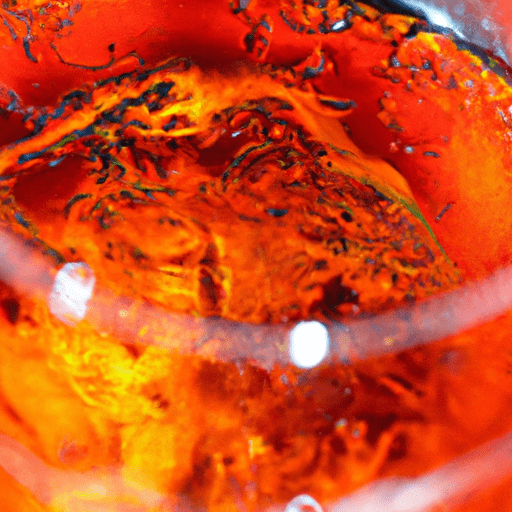The Delicate Essence of Orange-Flower Water
Have you ever wondered what angels smell like? If you haven’t had the pleasure of encountering one, let me introduce you to their heavenly scent in the form of orange-flower water. This aromatic liquid has been enchanting palates and perfumes for centuries, adding a touch of ethereal essence to a wide range of dishes. Join me as we dive into the captivating world of orange-flower water, exploring its taste, common uses in cooking, nutritional value, and intriguing history.
Unveiling the taste of orange-flower water
Orange-flower water is a distilled essence that captures the delicate fragrance of bitter orange blossoms. It boasts a mesmerizing combination of floral and citrus undertones, creating a subtle, sweet, and aromatic profile. The taste is light and refreshing, evoking a sense of Mediterranean sunshine and vibrant orange groves.
Versatile uses in culinary creations
Orange-flower water dazzles both sweet and savory dishes alike, offering a touch of sophistication and elegance to culinary creations. Its fragrant notes complement a wide range of ingredients, enhancing flavors and awakening the senses. Here are some popular uses of orange-flower water:
1. Baking and confections
In the realm of baking, orange-flower water reigns supreme. Just a splash can transform a plain dessert into a captivating masterpiece. From delicate almond cakes and flaky pastries to aromatic cookies and decadent custards, the possibilities are endless. Add a hint of orange-flower water to your next batch of madeleines or financiers, and watch as your guests are transported to a dreamy, citrus-scented oasis.
2. Middle Eastern and Mediterranean cuisine
Orange-flower water is a staple ingredient in Middle Eastern and Mediterranean cuisines. It is often found in traditional recipes like baklava, a tempting layered pastry drenched in honey syrup. This fragrant elixir also shines when incorporated into creamy rice puddings, fragrant biryanis, and tantalizing tagines. The exotic allure of orange-flower water adds depth and complexity to these dishes, taking them to new heights.
3. Cocktails and beverages
Embrace the art of mixology by introducing orange-flower water to your cocktails and non-alcoholic beverages. A few drops can elevate a simple glass of sparkling water, creating a refreshing and aromatic refresher. Experiment with adding it to martinis, margaritas, and even herbal iced teas for a touch of elegance and whimsy.
Nutritional value and benefits
While orange-flower water is undoubtedly a culinary treasure, it’s important to note that it is primarily used for its aromatic qualities rather than its nutritional content. Although it contains trace amounts of vitamins and minerals from the orange blossoms, its concentration is minimal. However, the joy it brings to your taste buds and the sensory experience it offers are immeasurable.
A glimpse into its captivating history
The story of orange-flower water stretches back centuries, steeped in rich cultural heritage. It was first distilled by Arab alchemists during the Islamic Golden Age, and its use quickly spread throughout the Arab world. From there, orange-flower water found its way to Europe, captivating the palates of the Renaissance elite. It became particularly fashionable in France, where it was cherished by royalty, used in perfumes, and incorporated into elaborate desserts.
Today, orange-flower water continues to inspire and delight chefs and home cooks around the world. Its timeless allure and delicate essence remind us of the beauty and intricacy found in nature’s bounty.
Whether you’re an accomplished chef or an adventurous home cook, orange-flower water invites you to explore the realms of flavor and fragrance. Let its enchanting scent transport you to sun-soaked gardens and fill your culinary creations with celestial charm. So, the next time you see a bottle of orange-flower water, don’t hesitate to indulge in its divine essence and unlock a world of captivating possibilities.
Embrace the magic of orange-flower water, and let your taste buds dance with delight!
Orange-Flower Water
Origin: Orange-flower water, also known as orange blossom water, is a clear, highly aromatic liquid distilled from the blossoms of bitter orange trees (Citrus aurantium). It is believed to have originated in the Middle East, specifically in countries such as Morocco, Tunisia, and Egypt.
Common Uses: Orange-flower water is commonly used as a flavoring agent in both sweet and savory dishes, as well as in various beverages. It is a popular ingredient in Middle Eastern, Mediterranean, and North African cuisines. It adds a delicate floral and citrus aroma to dishes and is often used in desserts like cakes, pastries, cookies, custards, and puddings. It is also used to enhance the flavor of beverages such as tea, lemonade, cocktails, and mocktails.
Nutritional Benefits: Orange-flower water does not provide significant nutritional value since it is mainly used for its aromatic properties. However, as it is derived from orange blossoms, it may contain some vitamins and antioxidants found in citrus fruits, although in small quantities.
Unique Properties: Orange-flower water has a distinct and refreshing fragrance that is reminiscent of orange blossoms. It is often described as having a floral, citrusy, and slightly sweet flavor profile. The intensity of its aroma can vary depending on the quality and concentration of the product. It is important to note that orange-flower water is highly concentrated, so a little goes a long way in recipes.
Historical Significance: Orange-flower water has a long history dating back to ancient civilizations, including the Egyptian and Islamic cultures. It was used for culinary and cosmetic purposes, as well as for its therapeutic properties. In the past, orange-flower water was highly prized and considered a luxury ingredient. Today, it continues to be cherished for its unique flavor and aroma, adding a touch of elegance to a wide range of dishes and beverages.




Use the share button below if you liked it.
It makes me smile, when I see it.